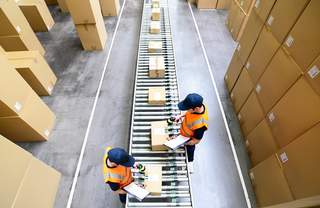
©fotolia.de/industrieblick
Facilitating Trade by Advancing Electronic Customs Procedures
Electronic customs processes are already the norm in the European Union. But even in this single customs area, there are 28 different IT customs systems. In addition, dispersed responsibilities complicate the import and export of goods: customs declarations and Value Added Tax (VAT) declarations, for example, are not regulated by the same administrative office.
Facilitation of Just-in-Time Deliveries
Speed is becoming more crucial in trade and commerce. Time is a key cost factor and affects the competitiveness of companies. Today, companies can rarely store all the thousands of individual parts for complex goods such as computers, vehicles, and aircrafts themselves. Rather, they use regional warehouses from which they call up just-in-time deliveries as needed. If the warehouse then receives a delivery order, the goods can be delivered without unnecessary delay. Modern customs systems need to function as digitalised and paperless as possible. In this way, just-in-time deliveries can be better organised, and storage costs can be reduced.
Ensure Electronic Customs Processes in the EU and Worldwide
In the EU, the Commission’s e-Customs Decision, the Modernised Customs Code (MCC) and ultimately the Union Customs Code (UCC) paved the way towards modernised customs systems. However, in 2018, the European Court of Auditors (ECA) found that the implementation of the new IT systems for the Customs Union suffered a series of delays. Thus, some of the key systems will not be available at the 2020 deadline set in the UCC. For EU businesses engaged in cross-border trade this means considerable legal and planning uncertainty, which entails unnecessary costs.
Despite these delays, the EU is way ahead of many other countries in modernising its customs processes. To facilitate trade worldwide, electronic customs procedures should become the norm globally. The Trade Facilitation Agreement of the World Trade Organization (WTO) aims precisely at this. The agreement, which came into force in March 2017, promises considerable trade simplification. According to the Gesellschaft für internationale Zusammenarbeit (GIZ), global trade costs can be reduced by 12.5 to 17.5 percent if implemented successfully, with corresponding positive effects on poverty reduction and employment. In addition to the cost-reducing effect, trade facilitation measures have a positive impact on issues such as food security, rural development, consumer protection, investment promotion, and good governance. Developing countries must be supported with the technical implementation of these measures.
Developed countries and companies have therefore committed themselves to the initiative "German Alliance for Trade Facilitation" to promote capacity building in developing and emerging countries. The aim is to create more efficient and cost-effective customs processes within the framework of the WTO Agreement – for example through reliable customs information or electronic pre-notification procedures. The Federal Ministry for Economic Cooperation and Development (BMZ) promotes the development of electronic customs clearance through GIZ projects in these third countries. For their part, companies contribute their technical expertise by describing the challenges of customs clearance in individual countries and by supporting the preparation of training materials. The BDI is supporting this project since 2016.
One-Stop-Shops and Centralised Clearance
One-stop-shops and centralised clearance would also greatly facilitate trade: the importer would then only have to contact a central customs office to complete all formalities, including VAT. A joint platform would enable all the necessary agencies and stakeholders to access the necessary data centrally and quickly. This would especially help small and medium-sized enterprises, which suffer considerably from administrative burdens. When companies enter foreign markets for the first time, a single point of contact is a significant simplification. For state authorities one-stop customs clearance would be an advantage, as well. In this way, it can be determined quickly and effectively whether all documents have been delivered.



